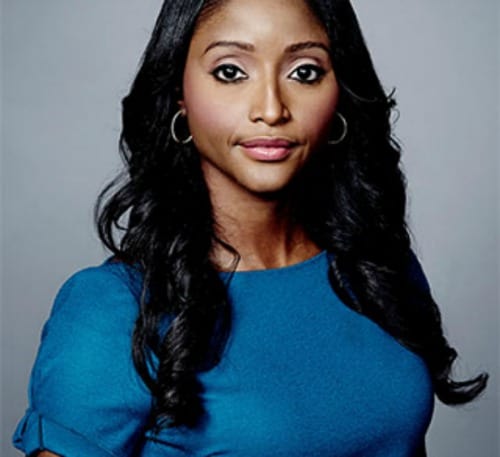CNN international anchor Isha Sesay (pictured) recently confronted global media while speaking on a special media panel at the CNN MultiChoice African Journalist Awards for not focusing on the effect of Ebola on thousands of people in Africa. Instead, Sesay suggested that outlets have centered their news coverage around the “few cases” in the United States, effectively contributing to the ignorance about the disease and sidestepping Africans’ humanity, according to Yahoo! News.
Keep Up With Face2Face Africa On Facebook!
Sesay, whose parents are from Sierra Leone, one of the areas most affected by Ebola in West Africa, says she is “an angry Black woman” over the media coverage on Ebola and the world’s inadequate response to it.
“I am an angry Black woman. I have a very tense relationship with the story because I’m living in the United States but my family is in Sierra Leone. My mother, brother, grandmother – most of my family – are in Sierra Leone right now.”
She also spoke about American ignorance about the disease:
“I’m in a place where America has taken this, in my words ‘bizarre’ approach to this public health emergency on our continent and the media in the United States has made it all about them and their few cases,” said Isha Sesay who spent much of her childhood in Sierra Leone.
“I was at the airport a couple of weeks ago and the driver was picking me up. I was there at the baggage carousel. And he said ‘Where are you from?’ And I said, I’m from Sierra Leone. And he took a step back from me.”
“And I thought: ‘Wow. How wretched a job have we done as the media that people think that just because I’m from Sierra Leone, that just being in my presence, regardless of whether I was in Sierra Leone or not, that I’m somehow inherently a carrier of Ebola,” said Sesay.
“What I’m seeing in the United States is this lack of knowledge. And not just a lack of knowledge, but also a lack of empathy for what we are going through right now on the continent. So I’m in a really difficult space right now,”
“The coverage of Ebola to date – before we moved to the situation where we’re now where the focus is so much on America and the fear that the Western hemisphere is going to be taken over by Ebola – the coverage of the continent had fixated on the continent, and so little on the people.”
“It was all about the disease stripping us of our dignity, that the stories of the people – what it is doing to individuals and families and communities – haven’t been told as much. We haven’t as media been that committed to telling it in as much as the continent deserves.”
Sesay then explained what she is personally doing to change this narrative; she has thrown her support behind Ebola Deeply, an “independent media project,” which she says is committed to sharing the news and information needed to stop the spread of the Ebola virus:
“I’m the co-founder of EbolaDeeply.org, because I want to change the discourse around Ebola and really bring in the voices of our people who are suffering, who may not be suffering from the disease directly but are being impacted,”
She also spoke to what changes need to happen in order for those affected by the virus to get the proper care — and coverage — that they deserve:
“The media needs to hold the international community to account, to say, ‘Where are you?’ We have an Ebola UN emergency fund, and there’s very little money in it. We have pledges being made, but the pledges aren’t being translated into action.”
“We have some countries saying they’re going to step up and a lot of countries sitting on the sidelines.”
“Where are we as the media asking those questions and holding people accountable, and staying on the stories and not averting our gaze and being sidetracked to cases of three people in the United States – people whose lives are valuable, critical – we don’t want anyone to die, but again, the epicentre is on the African continent. The responsibility lies with the journalists here in Africa to ask the questions,”
“We have to realise that the clock is ticking. The world has never had anything like this and the world really doesn’t know how to deal with numbers that is being put out there that could become a reality.”
“The media needs to do their part in getting the facts out, asking the questions, staying on this story, and tracking it and looking at the resources coming in to countries.”
“There’s a lot of stories to be told. There’s an information gap here. In the absence of information there’s hysteria. And there’s inertia,” said Sesay.
“I interviewed a survivor of Ebola from Liberia who not only has been cast out but his children are being cast out. He told me his car broke down the other day and the mechanics wouldn’t touch his car.
Responding to the same issue, Thomas Evans, CNN London’s bureau chief, added, “With the story of Ebola, the risk is quite high, so I wouldn’t recommend people rushing in without taking proper precautions.”
“That being said, that is not the only story – going in to an Ebola country. That is not the only way to tell this story. You can talk about what governments are doing, you can talk about the issues of healthcare systems — these are stories that are equally important.”
Currently, Sesay lives in Atlanta, Ga.
RELATED:
Mali Confirms Its First Ebola Case










